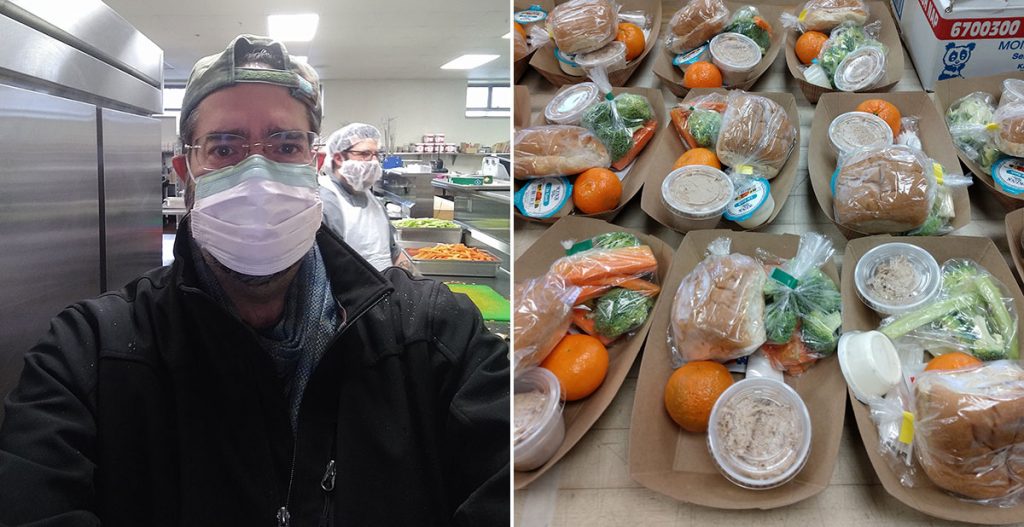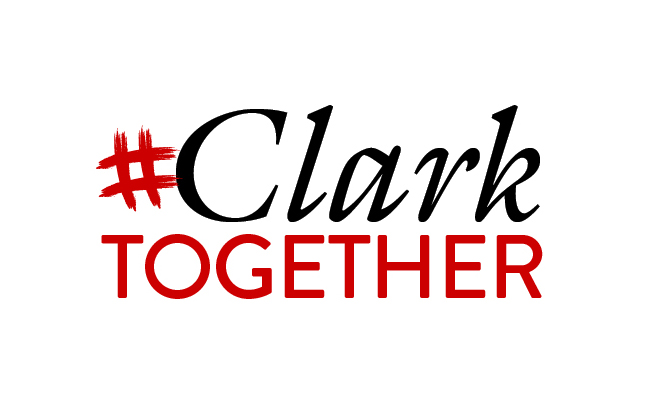#ClarkTogether
Professor Borges-Méndez supports Worcester schools nutrition program

Like many faculty members, Ramón Borges-Méndez, associate professor of community development and planning in the International Development, Community, and Environment Department, has had to adjust his everyday routine to include online course instruction and Zoom meetings, student advising, and social distancing. And when he’s not attending to his Clark students, he’s thinking of, and supporting, compassionate community partners who’ve had to leap into action to provide essential goods and services to vulnerable city residents impacted by COVID-19 closings.
 When COVID-19 concerns caused the Worcester Public Schools (WPS) to close in mid-March, members of the district’s Nutrition Program mobilized to ensure that students still had access to nutritious meals during the hiatus. In recent weeks, workers, staff, and administrators of the WPS have gathered every day in the kitchens at both North and Worcester Technical High School to prepare, package, and distribute approximately 1,000 breakfast/lunch combination meals a day and 3,000 meals every Fridays — to last for the weekend — for schoolchildren and other city residents in need. They are also providing meals for the provisional housing shelters created by the city.
When COVID-19 concerns caused the Worcester Public Schools (WPS) to close in mid-March, members of the district’s Nutrition Program mobilized to ensure that students still had access to nutritious meals during the hiatus. In recent weeks, workers, staff, and administrators of the WPS have gathered every day in the kitchens at both North and Worcester Technical High School to prepare, package, and distribute approximately 1,000 breakfast/lunch combination meals a day and 3,000 meals every Fridays — to last for the weekend — for schoolchildren and other city residents in need. They are also providing meals for the provisional housing shelters created by the city.
Donna Lombardi, who collaborates with Professor Borges-Méndez, is Child Nutrition Program director at the Worcester Public Schools. “Her committed and brave administrative and kitchen staff,” Borges-Méndez says, are providing breakfast and lunch packages to city residents during the pandemic. They prepare, package, and deliver, with several refrigerated trucks, fresh vegetables and fruits, cereals, sandwiches, and milk and other juice drinks to various locations through the city under strict food security and hygienic standards in compliance with USDA regulations.
“It has been a remarkable team effort involving city workers, public school volunteers, truck drivers, and private sector food distributors,” Borges-Méndez says. “I feel grateful to them for allowing me to collaborate [with them].”
Initially under the Working Cities Challenge sponsored by the Federal Reserve Bank of Boston and with subsequent funding from the Leir Foundation and Clark University, Borges-Méndez has worked with the Nutrition Program for the past two years, helping to restructure their workforce development and planning model. He also served on the Advisory Board of the Farm to Institution New England network, which is focused on increasing local food sourcing in schools, colleges, and hospitals.
“Workforce development training for ALL workers on safe food handling, pathogens, and allergens — plus culinary skills training — before the COVID-19 crisis hit allowed workers to understand their mission and job quickly and effectively,” he wrote. “They were ready to turn around their kitchen teams with regular duties into fast-moving action teams ready to tackle the crisis.” Borges-Méndez says that in America there are districts in which about a third of the children get their only meal of the day at school.
“It is fundamental to understand that nutrition and wellness is the first line of biological defense against sickness, and that having prepared and well-trained workers has been essential to meet the challenge. This crisis should alert policymakers that nutrition, workforce development, and a sense of public duty are critical components of dealing with an emergency situation like this, and crucial to the long-term health of our children and population.”
Borges-Mendez is currently using what he has learned in Worcester to put together a “rogue operation” with nonprofits and mayors to feed children on the island of Puerto Rico where, he says, food insecurity among children is far higher than it is in the 50 states. So far, the Department of Education of PR has refused to open the school kitchens to feed the children. He spends much of his time traveling between the mainland U.S. and his native Puerto Rico, where he and fellow IDCE faculty member Cynthia Caron ’90 are using the reconstruction of Puerto Rico’s coffee industry as a case study in resilience, and working to support women taking a larger role in the supply chain. He is co-founder and secretary of Fundación Bucarabón, a nonprofit organization that promotes women’s economic development in the mountains and low-income communities of Maricao, Puerto Rico.


